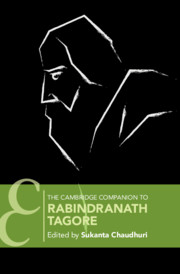Book contents
- Frontmatter
- Contents
- List of Illustrations
- Notes on Contributors
- Preface
- Note on Conventions and Practices
- 1 Rabindranath Tagore: From Art to Life
- 2 A Garland of Many Tagores
- Part I Overviews
- Part II Studies
- 12 Women, Gender, and the Family in Tagore
- 13 On the Seashore of Endless Worlds: Rabindranath and the Child
- 14 Tagore's View of History
- 15 Tagore's View of Politics and the Contemporary World
- 16 Tagore's Santiniketan: Learning Associated with Life
- 17 Tagore and Village Economy: A Vision of Wholeness
- 18 An Ecology of the Spirit: Rabindranath's Experience of Nature
- 19 Rabindranath and Science
- 20 Rabindranath Tagore as Literary Critic
- 21 Tagore's Aesthetics
- 22 Rabindranath, Bhakti, and the Bhakti Poets
- 23 Tagore and the Idea of Emancipation
- 24 Tagore's Thoughts on Religion
- 25 Rabindranath Tagore and Humanism
- List of Tagore's Works Cited, with Index
- Further Reading
- General Index
13 - On the Seashore of Endless Worlds: Rabindranath and the Child
from Part II - Studies
Published online by Cambridge University Press: 24 December 2019
- Frontmatter
- Contents
- List of Illustrations
- Notes on Contributors
- Preface
- Note on Conventions and Practices
- 1 Rabindranath Tagore: From Art to Life
- 2 A Garland of Many Tagores
- Part I Overviews
- Part II Studies
- 12 Women, Gender, and the Family in Tagore
- 13 On the Seashore of Endless Worlds: Rabindranath and the Child
- 14 Tagore's View of History
- 15 Tagore's View of Politics and the Contemporary World
- 16 Tagore's Santiniketan: Learning Associated with Life
- 17 Tagore and Village Economy: A Vision of Wholeness
- 18 An Ecology of the Spirit: Rabindranath's Experience of Nature
- 19 Rabindranath and Science
- 20 Rabindranath Tagore as Literary Critic
- 21 Tagore's Aesthetics
- 22 Rabindranath, Bhakti, and the Bhakti Poets
- 23 Tagore and the Idea of Emancipation
- 24 Tagore's Thoughts on Religion
- 25 Rabindranath Tagore and Humanism
- List of Tagore's Works Cited, with Index
- Further Reading
- General Index
Summary
A MESSAGE FROM THE KING
A darkness, impenetrably dense, was about to descend.
13 June 1940. The next day, the Nazi army would occupy Paris. As though to send out a call to the threatened population, a call full of trepidation but also with the hope of deliverance, the French translation of a Bengali play was broadcast on French radio.
That is not all. In March 1942, the Nazis established their first extermination camp, surpassing in cruelty the concentration camps in operation since 1933. Leaving no exit route, the extermination camp was, by definition, a ‘non-place’. But among those about to enter these waiting rooms of death, the same Bengali play, on a wait for death of a very different kind, found an audience. It was staged in Polish on 18 July 1942 in a Jewish orphanage in the Warsaw Ghetto just before its children went to the gas chamber. Translated five times into Polish till date, the play still retains a place in ‘collective Polish remembering’.
A peculiar chemistry of emotions must have been at work. Else how could a drama full of indomitable optimism become so compelling at a time when destruction proceeded so rapidly as to make a mockery of the very idea of death? The clue to the paradox lies in the figure of a child: a child simultaneously restive and immobilized.
The play was Rabindranāth Tagore's Dākghar (1912), translated by Debabrata Mukhopādhyāy (Devabrata Mukerjea) as The Post Office. Its child protagonist (whose very name, Amal, means ‘pure’) is terminally ill and confined indoors, yet deeply drawn to the world outside: ‘I would rather go about and see everything that there is.’ Sitting by his window, Amal watches a new building come up across the road. He learns it is a dākghar, a post office set up by the king. He is attracted by the word dāk, which in Bengali means both ‘call’ and ‘letter’: he longs to receive a letter with a call from the king. Rabindranath spoke of the genesis of Dākghar in a 1915 talk at Santiniketan. He observed that the play had no story as such: it was a prose lyric. He was driven to write it by the premonition of a catastrophe, perhaps his own death. Writing the play came as a great relief.
- Type
- Chapter
- Information
- The Cambridge Companion to Rabindranath Tagore , pp. 254 - 267Publisher: Cambridge University PressPrint publication year: 2020



